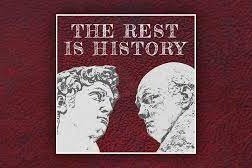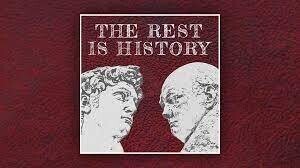
posted 19th March 2023

It’s just two men in a room, talking about the past. But it’s gripping, enlightening, and very useful for debaters.
On the podcast The Rest Is History Tom Holland and Dominic Sandbrook take a historical topic each week and have a conversation about it. But it is a particular kind of conversation. They make the past come alive by unveiling what happened then as if it is happening in front of them now, from moment to moment. Their boyish enthusiasm for their subject is infectious, and they have a unique gift for storytelling, pacing the narrative carefully, holding back enough to keep you listening, slipping in a twist or a revelation at just the right moment. That doesn’t mean that they dumb down. Their knowledge is based on profound research, and they analyse as well as describe.
They show how history matters now by making connections with the world today. The ruthless moral code of Calvin’s Geneva in the sixteenth century lives on in ‘cancel culture’ and Twitter pile-ons; the rise of the Nazis reminds us of the fragility of democracy in the face of populist demagogues like Trump and Bolsonaro. They balance each other well: Holland is more interested in pre-modern history, with a particular emphasis on the (often underestimated) role of Christianity in shaping the western world, while Sandbrook specialises in the twentieth century. There are moments when they lapse into blokeish in-jokes (the besetting sin of many a podcast), and there are a lot of adverts, but it is worth working through these annoyances.
Why should debaters be interested in history? Journalists sometimes talk about ‘deep background’, research which they don’t refer to explicitly in a story, but which underpins what they write about, and gives them a more profound grasp of the issues. A proper understanding of history can be a kind of deep background for understanding the contemporary world. Nothing comes out of nowhere; knowing where we have come from helps us to understand where we are now. Precedent - actions, ideas or movements from the past that are similar to what is happening now (or what might be proposed to happen in the future) - can provide debaters with valuable examples and arguments. A debater with a good grasp of history, both recent and further back, will be more strongly grounded than one who lives only in the present.





